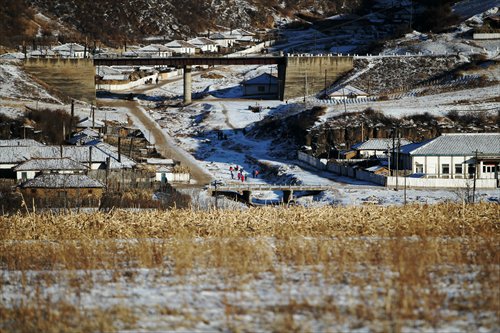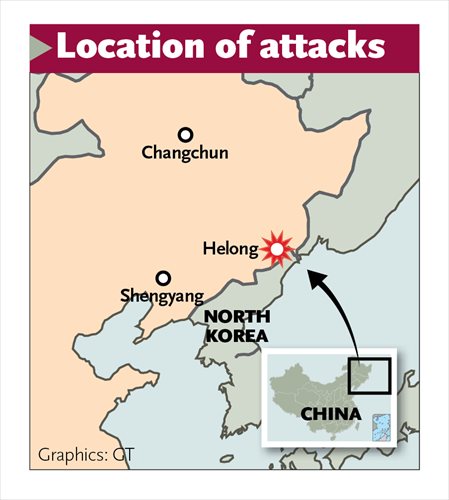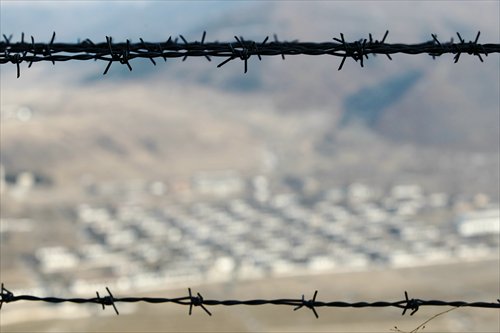Residents of towns near the North Korean border have safety worries following killings
Residents of towns near China's border with North Korea regularly see their foreign neighbors across the Tumen River that separates the two countries. Most of the people who live in these towns are seniors and children of Korean ethnicity as the young adults have mostly moved away. Following a recent incident in which a North Korean soldier crossed the border and committed a robbery, killing two elderly couples in the process, the security of these people living on the edge of the country has been an issue of some discussion.

North Korean children are seen playing on a frozen river in a village bordering China's Yanbian prefecture on Saturday. Photo: Cui Meng/GT

Any resident you talk to in the border towns of the Yanbian Korean Autonomous Prefecture in Jilin Province can remember encountering North Koreans. They tell stories of running into North Korean truck drivers in restaurants, meeting North Korean children while swimming in the Tumen River on the border, or in some cases, helping deserters who had fled to China.
In recent years however, locals have also started to tell stories of robberies, and even murders.
On December 27, 2014, a North Korean soldier went to a village in Helong, Yanbian prefecture and killed two elderly couples in the course of a robbery. The soldier was later shot dead by Chinese border police. This incident highlighted the issue of the security of Chinese towns near the North Korean border.
This is far from an isolated incident. In recent years there have been several cases of North Koreans coming across the border and committing crimes. At the same time, these border towns are becoming more vulnerable as young adults leave to find work in cities, leaving the elderly and children behind.

A barbed wire fence that runs along China's border with North Korea on January 15 in Yanbian Korean Autonomous Prefecture, Northeast China's Jilin Province Photo: Cui Meng/GT
The aftermath of the shooting
Jidi village in Nanping township, the scene of the recent shooting, has about 60 residents. They are mostly old people, whose children have left the area to work in South Korea.
Xu Chengzhe, the son of one of the murdered couples, told ifeng.com that his father "was shot in the head and lost one eye." He said that their room was riddled with bullet holes.
Xu Shanji, Xu Chengzhe's sister, told ifeng.com that they hope the government will give them compensation. Her brother is unmarried and they have an 80-year-old grandmother to care for. Since the incident, they have visited the local government repeatedly but have not received any response to their requests.
Following the shooting, security along the border has been tight. A taxi driver who drives between Helong and nearby towns, who gave his surname as Zhang, said the village is deserted now. The residents have moved to live with their children or gone to their relatives' houses in town. Now, police are the only people in the village.
"Of course they are afraid," he said. "What matters more than your life?"
The local police have set up more security checkpoints on the roads leading to some border towns, stopping every car that comes past and checking the passengers' ID cards.
Dangerous neighbors
In September 2014, a North Korean came into Yanbian prefecture's Nanping town at night and killed Li Chunfeng, his wife, and their 26-year-old son, the Beijing News reported.
Li's son-in-law, surnamed Yong, told the newspaper that the North Korean pried open the window and killed them with a hammer. The local police later gave Yong two cellphones, 500 yuan ($80) and a handbag that the criminal had stolen from his in-laws. The criminal was caught by a North Korean border patrol as he tried to sneak back into North Korea.
These types of encounters take place frequently in many border towns, villagers told the Global Times, but they do not always involve violence.
The town of Sanhe, about 100 kilometers east of Helong, used to be a flourishing community of about 2,000 people, but now that number has waned to about 500, mostly seniors and children. When the Global Times visited one afternoon, the streets were empty. A few locals were congregated in an activity room at the edge of the town, playing mahjong.
The town is directly across the Tumen River from the North Korean town of Hoeryong. If one climbs on a nearby hill the town is clearly visible, as is a border crossing where trucks line up to carry goods from China into North Korea and vice versa.
Jin Yunhe, whose grandfather came from the Korean Peninsula to Sanhe before the founding of the People's Republic of China in 1949, has lived in the town all his life. The 71-year-old man used to work at the local forest farm and became the head of the local Senior Citizen Society after he retired.
He remembers that a few years ago, a North Korean came to Sanhe to burgle houses. That person tied an old couple to a chair and robbed them of everything he could take. The old couple eventually froze to death, as Jilin is bitterly cold in winter.
Jin Qiangyi, director of the Asia Studies Center at Yanbian University, told the Global Times that such incidents occur frequently near the Sino-Korean border. The people who commit these crimes are not defectors, he said.
Some come over and steal because their lives are hard in North Korea. "The hungry North Koreans searching for food will eventually go back to their country," Jin said.
Jin has studied North Korean defectors and talked in depth with both defectors and residents alike. He has heard many such stories from residents.
Jin Yunhe visited his aunt and uncle in North Korea a couple of years ago and was shocked by their poverty.
"They earn about 3 yuan per month," he said. "They don't even have decent clothes. What kind of life is that?"
Border town security
According to the Guangzhou-based Southern Weekly newspaper, there seems to be a correlation between North Korea's internal problems and cross-border crimes.
In January 2003, North Korea declared, for the second time, that it would withdraw from the Treaty on the Non-Proliferation of Nuclear Weapons and was sanctioned by many countries. The same month, a few North Korean soldiers robbed residents of a town in Hunchun, Yanbian prefecture and ran back into North Korea after firing a few shots.
Around the end of 2006, North Korean crops failed and in June 2007, a village in Yanbian's Longjing was robbed by an armed North Korean soldier. He demanded every family give him rice, oil and clothes. The local City Evening News reported that July that the robber was caught by Chinese border police.
The security in border towns has always been tight. Border security, local police and forestry police all have checkpoints along the border, the China Defense News reported on January 14, and there are also militias who patrol the area, to help protect villagers from desperate North Koreans.
Along the river, barbed wire fences try to keep potential border-crossers in their respective countries. Residents used to be able to go down to the Tumen River and wash their clothes. Now, the fences stop Chinese citizens getting closer than around 200 meters from the river.
In recent years, the Yanbian border security forces have given border town residents free cellphones so that they can alert the police quickly in case of an emergency.
Jin Yunhe says that the massive police presence makes him feel safe, despite the recent murders.
Changing attitudes
During the North Korean famine of the 1990s, many deserters flooded into the border towns, Jin Qiangyi said. During that time, he personally helped many defectors, providing them with food and water alongside NGOs which carry out this kind of work.
"Back then, North Korean defectors came in groups, and the local Chinese residents would steam buns for them and wait for them along the streets," he said.
A tour guide based in Yanji, an hour west of Sanhe by car, who gave his surname as Du, said he used to see many North Koreans in Changbai township. He says that people secretly trade across the border, wading across the river and exchanging goods.
But he says now Chinese people are more wary of North Koreans, especially after so many violent incidents.
Once, while he was exercising in the mountains, he saw someone who didn't look like a local resident. He suspected the man was North Korean and approached him. Then the person turned around and saw Du. The first thing he said was "cigarette lighter," in Chinese.
Du did not hand the man a lighter, as he worried that the man wanted to start a forest fire. He asked the man repeatedly what he wanted the lighter for, but the man's only knowledge of Chinese was "cigarette lighter."
"He gestured toward the woods, and said, 'Poof!' I was startled, I thought, gosh, he wants to start a fire!" Du said.
Du walked for an hour and eventually reached some border guards. He told them about the man, and said that someone suspicious was in the mountains. When he checked back a couple of days later, Chinese border guards had caught the man, a North Korean civilian.
At the same time, border towns are increasingly made up of vulnerable residents. Jin Yunhe said has two sons, one works in South Korea and the other works at a Korean company in Beijing.
De-sensitize the issue
Since the shooting, the government and police departments of Helong city and Nanping town have not been taking calls from the media. Sanhe town's police bureau chief told the Global Times that he has received orders not to talk to the media, unless given permission by the Jilin Public Security Bureau.
Jin Qiangyi, the Yanbian University professor, said that right now, official bodies put too much emphasis on the North Korea issue as being "sensitive," and not enough information is publicly available.
"But the thing is, it has harmed our border residents' lives. The security of our residents is at risk. There should at least be some information from the government so that the residents know how to prevent further assaults," he said.
In the future, there might be many issues in the border area, Jin said. The first reason for this is North Korea's economic problems. The second is that North Koreans are becoming more desperate, because their lives are hard and their social atmosphere is strict, he argued.
Jin Yunhe's sons have repeatedly asked him to move to Beijing but Jin refused. "The air and water are better here," he said.
He is not optimistic about his dwindling community's future however.
"In 10 years, this town will be gone!" he said.
Newspaper headline: Living on the edge